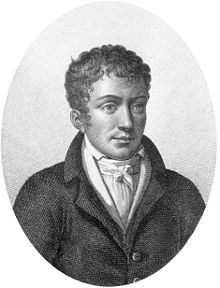Pierre-Jean-Georges Cabanis
Pierre-Jean-Georges Cabanis (born June 5, 1757 in Cosnac in what is now the Corrèze department ; † May 5, 1808 in Rueil in the Val-d'Oise department near Meulan ) was a French physician , physiologist and philosopher .
Live and act
Pierre-Jean-Georges Cabanis was born in Limousin as the son of Jean Baptiste Cabanis (1725–1786), a lawyer and agronomist. His mother was Marie-Hélène d'Escarolle de Souleyrac († 1765). At the age of ten, he attended the college in Brive-la-Gaillarde .
Cabanis studied Humaniora in Paris and in 1773 accompanied a Polish nobleman to Warsaw , where he worked for him as a secretary. From 1773 to 1775 he traveled through Germany and Poland.
Cabanis is strongly inspired by the English thought leader of the Enlightenment and philosopher John Locke , whose writings he read during his studies and accompanied him on his way to the classical philosophy and philosophy of his time. But the works of Étienne Bonnot de Condillac were also very well received by him. His original contribution was the introduction of the considerations of both thinkers into the physiology and psychology of his time.
From 1775 he devoted himself to medicine in Paris and practiced as a doctor in Auteuil . During the reign of terror he lived in seclusion and in 1794 became professor at the clinic at the medical school in Paris and member of the Council of Five Hundred , Conseil des Cinq-Cents . An important confidante was the medical colleague from the Montpellier school, the doctor and author Pierre Roussel . Cabani's Observations sur les hôpitaux , published in 1790, gave him the necessary reputation for a job as administrator of the hospitals in Paris, membre de la commission des hôpitaux, and from 1795 he became professor of hygiene at the Medical Faculty of Paris.
The work of Cabanis can be divided into three main groups, those on the history of medicine, and on the organization of medical education and hospitals. And as the last group, that of the philosophy of medicine and in particular the relationship between the physical and the moral, modern physiology and psychology.
In biology he represented a vitalistic position of the school around Georg Ernst Stahl , which becomes clear in the posthumously published work, Lettre sur les causes premières (1824). A full edition of Cabani's work was only begun posthumously in 1825 and published in five volumes. In his main work, Rapports du physique et du moral de l'homme , he describes the relationships that exist between the physical and mental aspects of humans. For Cabanis, psychology is directly linked to biology. All mental processes are developed from sensuality and sensuality itself is a property of the nervous system. The soul is not a structure, but a faculty, a function of the brain. Just as the stomach and intestines receive food to digest, so the brain digests impressions and secretes them as thoughts.
He regularly attended the society of Madame Helvetius in Auteuil , where he was in contact with other leading people of his time.
During the last two years of Honoré Mirabeau's life , he was closely connected with him and gave him his care as a doctor.
On Saturday, May 14, 1796, Cabanis married Charlotte Félicité de Grouchy (1768-1844), the sister of Marshal Emmanuel de Grouchy and Sophie de Grouchy (1764-1822). This marriage had a daughter, Annette Paméla Cabanis (* 1800).
From 1803 until his death he was a member of the Académie française ( seat 40 ). He was a member of the Masonic lodge founded in 1776, the Les Neuf Sœurs . In 1786 he was elected a member of the American Philosophical Society .
Cabanis was buried in the Panthéon in Paris. His heart was buried in the Auteuil cemetery.
Works (selection)
- Observations on the hôpitaux . Paris 1790 (digitized)
- Journal de la maladie et de la mort d'Honoré-Gabriel-Victor-Riquetti de Mirabeau , 1791
- You degré de certitude de la médecine . F. Didot, Paris 1798 (digitized version)
- Report on the organization des écoles de médecine , 1799
- Quelques considérations sur l'organization sociale , 1799
-
Rapports du physique et du moral de l'homme , 1802 (Second edition 1805, Volume I (digitized version) , Volume II (digitized version) )
- Ludwig Heinrich Jakob (translator). About the connection between the physical and the moral in man. Halle and Leipzig 1804, Volume I (digitized version) , Volume II (digitized version)
- Coup d'œil sur les révolutions et la réforme de la médecine . Chapard, Caille and Ravier Paris 1804 (digitized)
- Observations sur les affections catarrhales , 1807
literature
- Schiff, Emil: Pierre Jean Georges Cabanis the doctor and philosopher (1757-1808): a contribution to the history of the more recent medicine and philosophy (1886) . HS Hermann, Berlin (1886) [1]
Web links
Individual evidence
- ^ Wolfgang Neuser : Cabanis, Pierre-Jean-Georges. In: Werner E. Gerabek , Bernhard D. Haage, Gundolf Keil , Wolfgang Wegner (eds.): Enzyklopädie Medizingeschichte. De Gruyter, Berlin / New York 2005, ISBN 3-11-015714-4 , p. 227.
- ↑ Genealogy ( Memento of the original from August 7, 2012 in the Internet Archive ) Info: The archive link was automatically inserted and not yet checked. Please check the original and archive link according to the instructions and then remove this notice.
- ↑ HISTOIRE DES SCIENCES MEDICALES ORGANE OFFICIEL DE LA SOCIÉTÉ FRANÇAISE D'HISTOIRE DE LA MÉDECINE. P. 491, online (PDF; 66.9 MB)
- ^ Genealogy Charlotte de Grouchy
- ↑ Genealogy of the daughter
- ↑ Member Histoty: Pierre JG Cabanis. American Philosophical Society, accessed May 27, 2018 .
| personal data | |
|---|---|
| SURNAME | Cabanis, Pierre-Jean-Georges |
| BRIEF DESCRIPTION | French medic, physiologist and philosopher |
| DATE OF BIRTH | June 5, 1757 |
| PLACE OF BIRTH | Cosnac , Corrèze department |
| DATE OF DEATH | May 5, 1808 |
| Place of death | Meulan |
